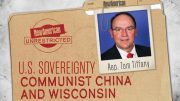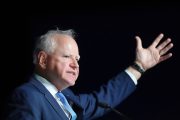In a tweet sent February 22, presidential candidate Donald Trump (shown) said: “It is so important to audit The Federal Reserve, and yet Ted Cruz missed the vote on the bill that would allow this to be done.”
The vote in question was taken on January 12, and was on a motion to invoke cloture, which, if successful, would have allowed S. 2232, the Federal Reserve Transparency Act of 2015, sponsored by Senator Rand Paul (R-Ky.), to be brought to the floor of the Senate for a vote.
S. 2232 requires a full audit of the Board of Governors of the Federal Reserve System and the Federal Reserve banks by the Comptroller General of the United States.
Although a majority of senators supported the bill, with 53 voting in favor of it and 44 against it, that was not enough to overcome the 60-vote threshold needed to invoke cloture. The bill was supported by all Republican senators except one, Bob Corker of Tennessee. It was opposed by all Democrat senators except Tammy Baldwin of Wisconsin and independent presidential candidate Bernie Sanders, who is seeking the Democratic nomination.
Cruz was one of 26 senators to cosponsor the bill, but missed the January 12 vote, as Trump has just pointed out. Cruz missed the vote because he was campaigning in New Hampshire prior to that state’s presidential primary. However, even if he had been present to vote in favor of Paul’s bill, the legislation would have still been short of the 60 votes required to go to the floor for a vote.
Paul also tweeted his displeasure with Cruz’s absence, saying that voters “can’t even trust Ted to show up to vote on an issue as important as Audit the Fed.”
And Paul’s father, former Representative Ron Paul (R-Texas), also wrote a critical tweet: “Ted Cruz says he is for Auditing the Fed, but when the Senate voted on Rand’s bill, Ted was nowhere to be found.”
The younger Paul and Cruz were rivals for the GOP presidential nomination at the time of the vote, but Paul suspended his campaign on February 3, following his disappointing showing in the Iowa caucus. He is currently running for reelection to the Senate. The Wall Street Journal reported on February 22 that Paul has no plans to endorse another candidate in the GOP race for the presidency.
As for Trump’s decision to criticize Cruz for missing the vote six weeks after it took place, the most reasonable explanation is that although Trump won the South Carolina primary with 32.5 percent of the vote, rivals Cruz and Marco Rubio (R-Fla.) were not far behind with about 22.5 percent each. With the March first “Super Tuesday” voting coming up — the day in which nine state will hold primaries and another four will conduct caucuses — Trump may have seen Cruz’s absence for the Audit the Fed bill as a good campaign talking point.
Though Paul had often criticized Rubio for skipping Senate votes to campaign for president, the Florida senator was among the 53 senators who voted in favor of cloture on the bill.
Trump’s tweet attacking Cruz was one of the first times (and perhaps the first time) he has come out in favor of auditing the Fed, though he has voiced some mild criticism of the central bank in the past.
During a TV interview with Bloomberg Politics last August, Trump expressed some reservations concerning the Fed’s interest rate policies:
Right now, we have the low rates. In terms of real estate, if I want to develop … from that standpoint I like low interest rates. From the country’s standpoint, I’m just not sure it’s a very good thing, because I really do believe we’re creating a bubble.
A writer for the Washington Post, commenting on Trump’s statement, reported that Trump was referring to the Fed’s benchmark interest rate, which has been at zero since the financial crisis in 2008. The article noted that the Fed has kept the interest rate there long after the recession officially ended “in hopes of spurring a faster economic recovery.”
The writer then moved on to Trump, stating:
Actually, Trump’s answer is pretty mild compared to the positions of other Republican presidential candidates. One of the pillars of Kentucky Sen. Rand Paul’s campaign is his effort to Audit the Fed, which still does not go quite as far as his father Ron Paul’s quest to End the Fed. Texas Sen. Ted Cruz has also joined the younger Paul’s fight against the Fed.
As of last summer, at least, Trump was decidedly less “anti-Fed” than either Paul or Cruz.
On the same day the Post article came out, Chris Rossini, an editor and writer for the Ron Paul Liberty Report, offered his own analysis of Trump’s statements in a article headlined “Trump Needs A Little Help With Understanding The Federal Reserve.”
Rossini offered kudos to Trump for “pinning the blame on the Fed for creating (yet another) bubble,” and offered these congratulatory words: “Good for Donald for pointing the finger right where it belongs.” But the article went on to correct some serious deficiencies in Trump’s knowledge:
The rest of Trump’s understanding of The Fed needs a little work though. He says that as a developer, he likes “low interest rates.” Now, with sound money (which, because of The Fed, we do not have) enjoying low borrowing costs makes perfect sense. But The Fed creates artificially low interest rates, which means investments must be made in error (and en masse) by businessmen.
During the artificial boom, Trump and many other businessmen will feel like geniuses, on paper. It will appear to them that their investments were brilliant decisions, and thanks to The Fed, they were able to make those investments. However, just because Donald can build, it doesn’t mean that he should build. [Emphasis in original.]
The article correctly noted that “the Federal Reserve is the source of price inflation. By printing (i.e., counterfeiting) money, they steal the purchasing power of every dollar that everyone holds.” (Emphasis in original.)
Rossini concluded:
Donald, with his comment, shows a tiny glimmer of understanding The Fed. But he needs help to actually be someone that’s able to do something about it, and more importantly understand why he’s doing it. [Emphasis in original.]
Has Trump learned enough about the Fed since last August to become someone who will be able to do something about the Fed? Since he did not send his tweet criticizing Cruz for missing the vote on Paul’s audit the Fed bill until six weeks after the fact, and has only recently said that he favors auditing the Fed, it is more likely that he still understands politics much better than economics. Should Trump manage to win the presidential election, he would definitely need to put someone such as economist Mark Skousen in his administration to provide him with a quick course in Free Market Economics 101.
Related articles:
Senate Blocks “Audit the Fed,” Preserving Central Bank Secrecy
Rand Paul Asks Watchdog to Investigate Fed’s Lobbying Against Transparency
Does the Bell Toll for the Fed?
The Federal Reserve Still Going Wrong at 100
Congress and the Fed Refuse to Learn From Their Mistakes
Blame the Federal Reserve, Not China, for Stock Market Crash
Ron Paul Interview with The New American
Vast Majority Want to Audit the Federal Reserve, Poll Shows
Led by Rep. Ron Paul, Congress Explores Sound Money
Ron Paul’s Final Questions for Fed Chairman Ben Bernanke




